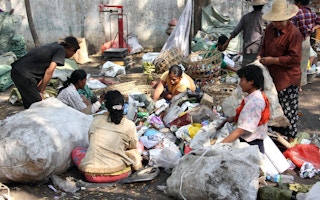From green economy plans to the Sustainable Development Goals, ambitions for growth have the word ‘inclusive’ built into them. It’s an easy word to say. But it has profound implications, not least for how we address the largest – yet often least visible – part of the economy: the informal economy.
Our event with partners on ‘The biggest ‘private sector’: what place for the informal economy in green and inclusive growth?’, brought together decision makers, practitioners and researchers to debate this issue.
Speakers laid bare the size and scale of the challenge as participants considered how best to integrate the informal economy in plans for inclusive green growth, identifying six key principles going forward.
The broad base of economies
In most developing countries, the informal economy is far bigger than the formal economy and equally diverse, including small-scale farmers, forest workers, artisanal miners, furniture makers, waste pickers and street vendors, and more.
Worth US$175 billion, the food economy is the largest informal sector in West Africa. Artisanal and small-scale mining is also significant, employing up to 30 million people worldwide – with another 120 million involved in related activities downstream. In Indonesia, the informal forestry sector contributes around EUR €63 million to local economies.
“The informal economy is not just the bottom of the pyramid – it is the broad base of the economy,” according to the international coordinator of the event partner WEIGO, Martha Chen.
In the informal economy levels of productivity are low and people are poor. But there seems little alternative. Even in good economic times, the formal economy simply does not have enough capacity to create the number of jobs needed to shift people out of informality.
So the question is how do we deal with it?
Neglect and persecution
The stock response to informal workers is neglect at best, persecution at worst. From India to the United States, most business management schools focus on the formal economy. And most regulations are designed for the formal economy and are either irrelevant or biased against informal workers and businesses.
The resulting narratives on informality are negative. Big business and mainstream economists refer to the informal economy as a ‘drag’, ‘painful’, ‘illegal’ or ‘unproductive’. And law enforcers may treat informal workers as criminals. One WEIGO study shows that one in two street vendors experience harassment and arbitrary confiscation of their goods.
But it’s important to distinguish between groups of the informal self-employed. There are the ‘illegals – who deal in illegal goods and services. There are the’‘evaders’ who use informality to avoid regulations or tax. And there are the ‘others’.
Evidence suggests that illegals and evaders make up a tiny proportion with most informal workers – the ‘others’ – simply the working poor, trying to earn a living. For them, existing regulations are often irrelevant or inappropriate and many taxes or tax thresholds do not apply.
“The whole of the informal economy should not be tarred by the same brush as illegals or evaders,” said Chen.
Participants also agreed that we need a new framework for tackling informality – one that integrates it into the inclusive green growth agenda. But what does that new framework look like?
Principles for integration
Building a crisp and detailed proposition takes more than one meeting, but a set of six principles emerged from the discussions that could guide the development of a new policy agenda on informality and green growth:
- Use positive language
There’s a clear need to move away from prejudiced narratives on the informal economy towards language that is upbeat and helps realise the dynamism that can be found in the informal sector. “We need to find words to describe this bottom-up, locally-based, innovative and wonderful diversity that gives strength to economic ecosystems,” said Camilla Toulmin of IIED.
- Build platforms for exchange
If informal workers are to identify their needs, talk about them and engage governments to shape policies that address them, then they need access to platforms where they can come together. Three types have been tried and tested in cities across the global South: information sharing platforms; dialogue platforms; and negotiation platforms.
- Support self-organisation
The starting point for any new policy agenda should be to support informal workers to self-organise. From the waste pickers in Colombia that have won government waste contracts to the 5.5 million micro-businesses that have been formalised in Brazil, success stories about integrating the informal economy begin with self-organisation.
- Design from the bottom-up
This is about economic and policy planning where informal workers – including the poor, ethnic groups and all genders – are given a seat at the table on their own terms. These terms of inclusion are critical: just being included is not necessarily enough.
- Use evidence
There are many excellent examples of best practice and these should be captured and used to drive learning and exchange across countries and contexts. At the same time, there is a need for hard evidence on the scale and contribution of the informal economy, which is often unmeasured and invisible in official statistics.
- Look beyond regulation:
Policymakers may look for easy proxies, such as legality and formalisation. But legality can be inherently anti-poor if there are no safety measures in place. And small-scale producers will not formalise if it is bureaucratically cumbersome, expensive, and comes without any benefits.
Achieving regulation that isn’t punitive means looking beyond regulation to include support mechanisms for building skills and accessing information, markets and finance as part of any formalisation effort.
Sian Lewis is a staff writer in IIED’s Communications Group. This post is republished from IIED’s blog.











